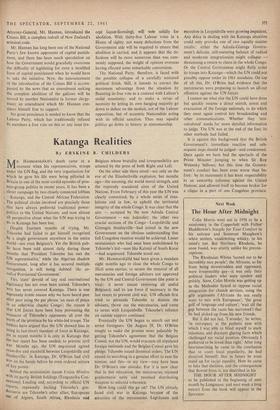Next Week
The Hour After Midnight
Colin Morris went out in 1956 to be a missionary in the Copperbelt with Father Huddleston's Naught for Your Comfort in his suitcase and 'Somerset Maugham's white settlers, sundowning whisky, in his mind's eye. But Northern Rhodesia, he soon found, was utterly unlike his precon- ceptions.
The Rhodesian Whites 'turned out to be incredibly nice people'; the Africans, so far from being downtrodden and oppressed, were irrepressibly gay—it was only their political leaders who were sombre and prickly. Soon, Colin Morris was getting up in the Methodist Synod to oppose racial integration for church services, using the glib arguments rAfricans do not, really want to mix with Europeans'; 'the great gulf of language and culture'; 'wait till the gap between the races has narrowed') that he had picked up from his new friends.
But it did not last. 'I wonder,' he writes, `in retrospect, at the pathetic ease with which 1 was able to blind myself to stark injustices, and discount glaring facts which challenged my racial position. Obviously I preferred to be loved than right.' After long heartsearching he came to the conclusion that to court local popularity, he had deceived himself; that in future he must stand up for racial equality. How he came to take that decision, and the consequences that flowed from it, are described in his THE HOUR AFTER MIDNIGHT to be published at the beginning of next month by Longmans; and next week a long extract from the book will appear in the Spectator.










































 Previous page
Previous page